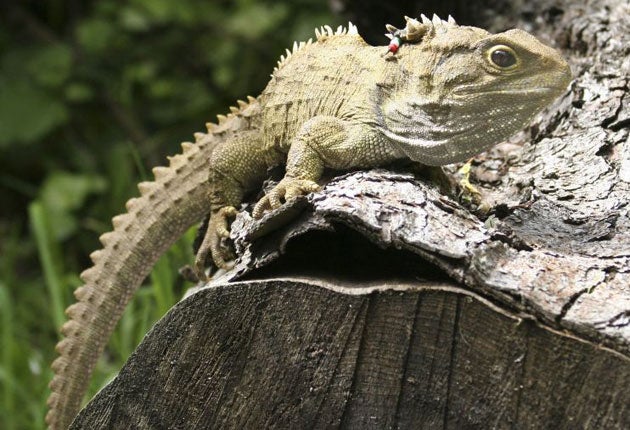Henry the tuatara is a dad at 111

Your support helps us to tell the story
From reproductive rights to climate change to Big Tech, The Independent is on the ground when the story is developing. Whether it's investigating the financials of Elon Musk's pro-Trump PAC or producing our latest documentary, 'The A Word', which shines a light on the American women fighting for reproductive rights, we know how important it is to parse out the facts from the messaging.
At such a critical moment in US history, we need reporters on the ground. Your donation allows us to keep sending journalists to speak to both sides of the story.
The Independent is trusted by Americans across the entire political spectrum. And unlike many other quality news outlets, we choose not to lock Americans out of our reporting and analysis with paywalls. We believe quality journalism should be available to everyone, paid for by those who can afford it.
Your support makes all the difference.A rare reptile has become a father at the age of 111 for the first time. Henry, a New Zealand tuatara, confounded experts who believed he was past it when he succumbed to the charms of Mildred last year.
The female, who is estimated to be in her seventies, laid 12 eggs and yesterday, after 223 days of incubation, 11 baby tuatara successfully hatched.
Henry, a long-time resident of the Southland Museum and Art Gallery, on South Island, had previously ignored female tuatara, or even attacked them. As well as finally proving Henry’s virility, the hatchlings will give a much-needed boost to the genetic diversity of an endangered species.
Tuatara, which resemble lizards and can claim a lineage dating back 220 million years, are estimated to number 50,000, with most living in predator-free sanctuaries or on New Zealand’s offshore islands.
When the museum, in the town of Invercargill, became his home in 1970, Henry was already aged at least 70. He proved to be “a grumpy old man”, and was kept in solitary confinement because of his aggressive behaviour. When staff first tried to persuade him to mate with Mildred 25 years ago, he bit off her tail. But last year his keepers found a cancerous tumour beneath his genitals and when the tumour was removed his libido was restored.
The tuatara curator, Lindsay Hazley, who has looked after Henry for 36 years, said his charge’s personality had changed completely after the operation. Mr Hazley, who rushed home from holiday to attend the births said that he was “over the moon”.
The offspring are being looked after away from their parents because adult tuataras sometimes eat their young. Tuataras reach sexual maturity at 20
and can live to between 150 and 250 years, which gives Henry plenty of opportunity to make up for lost time. He is expected to mate with Lucy, one of three females he currently lives with, in the spring.
The museum, which has 72 tuatara following 42 hatchings during the last two years, plans to post three hours of footage of the latest arrivals on its website, www.southlandmuseum.com.
Join our commenting forum
Join thought-provoking conversations, follow other Independent readers and see their replies
Comments